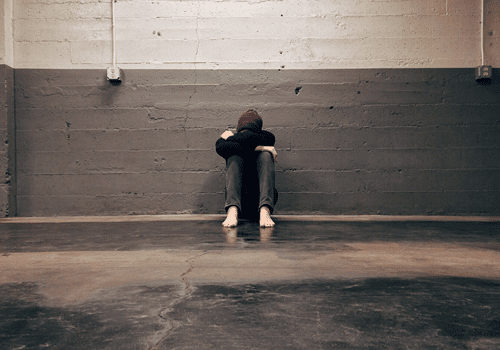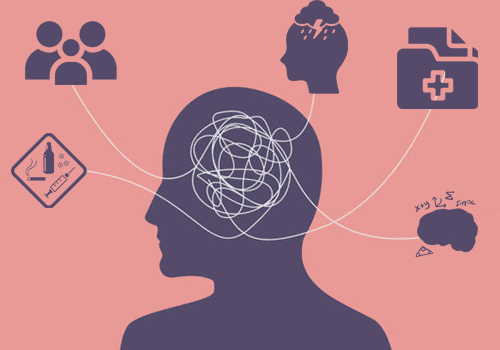“Anxiety disorders are the most common mental illness in the U.S, affecting 40 million adults of age 18 and older, or 18.1% of the population every year.” Says the Anxiety & Depression Association of America.
It is fairly common to experience anxiousness every once in a while during social situations like giving public speeches and interviews. But when such anxiousness becomes a daily occurrence for an individual, then it can be a cause of concern.
Anxiety is defined as a feeling of persistent worry, fear, nervousness, and dread about what’s about to happen or what is to come. Anxiety is regarded as a normal response to stressful situations in life.
Where fear is an emotion that we experience during the presence of a threat; anxiety occurs as a sense of anticipated danger.
It is essential to consult a mental health expert like a psychologist or psychiatrist to get effective treatment for an anxiety disorder. Anxiety can also signal an underlying health condition when one starts experiencing feelings of anxiety that become excessive, all-consuming and interfere with daily living.
Table of Contents

What’s Anxiety Disorder?
Anxiety disorders are medically defined as a type of mental health disorder that makes a person experience a feeling of fear and dread during everyday life situations.
In other words, anxiety disorders are characterized by a repeated episode of feelings of intense anxiety, fear, or terror that may cause problems in everyday life situations.
A mental health complication like anxiety disorder won’t go away on its own; one needs to get proper medical treatment to manage such disorders.
The symptoms of anxiety disorder can have an impact on daily life activities like schoolwork, job performance, and personal relationships.
What Are the Signs of Anxiety Disorder?
The most apparent sign of an anxiety disorder is the persistent feeling of excessive worry and fear.
The signs of an anxiety disorder can vary among patients and mainly depends upon the type of anxiety disorder that has been diagnosed. Some of the most common signs of anxiety disorder are as follows.
- Feeling nervous and tensed
- Shortness of breath
- Problems with concentration
- Heart palpitations
- Sweating and trembling
- Feeling weak and constantly tired
- A feeling of panic and danger
- Difficulty in controlling worry
- Avoiding things that trigger anxiety
- Having difficulty in sleeping
Experiencing such anxiety symptoms can significantly reduce the quality of life for an individual and result in many medical complications.
Though people are becoming more aware than ever of mental health issues like anxiety and depression, many people still hesitate in seeking out the necessary medical treatment.

What Causes Anxiety Disorder to Develop?
Researchers are not exactly sure yet about what exactly leads a person to develop an anxiety disorder. However, it is believed that there are numerous biological, environmental, and social factors that lead to an anxiety disorder.
It is vital to get a proper medical diagnosis by a mental health expert to know the anxiety disorder causes that are to be treated. Some of the most common types of anxiety disorders are generalized anxiety disorder, obsessive-compulsive disorder, social phobia, panic disorder, and post-traumatic stress disorder.
Anxiety disorders can occur due to the following reasons.
Family history:
Researchers estimate that mental health complications like anxiety disorder often run in the family history. People do have a specific genetic feature that makes them prone to develop anxiety.
One becomes more likely to develop an anxiety disorder even if one family member gets diagnosed with a similar illness.
Trauma:
People who have experienced some traumatic events in life like abuse, loss of a loved one, severe injury, or unemployment can often trigger anxiety symptoms.
Suffering such traumatic and stressful events in life or witnessing them can make one more likely to develop an anxiety disorder.
Personality:
Certain personality traits make one more likely to develop an anxiety disorder. Features like behavioural inhibition, shyness, and avoiding unfamiliar people put an individual at a heightened risk of developing an anxiety disorder.
Experiencing traumatic or stressful events early in life during childhood or adulthood can also lead to the development of such personality traits in life.
Medical conditions:
There are certain medicines like corticosteroids, ADHD drugs, or medication containing caffeine components that are known to cause anxiety symptoms.
Additionally, there are certain medical conditions like thyroid hormone imbalance, diabetes, or heart diseases that can trigger similar symptoms to that of an anxiety disorder.
Check out some commonly prescribed medicines for diabetes and hypertension: Metformin(Glycomet), Glibenclamide(Semi Daonil) and Doxazosin(Doxacard) respectively.
It is essential to thoroughly examine the patient to rule out the possibility of any underlying medical condition or side effects.
Therefore, it is recommended to consult a doctor.
Substance abuse:
People who smoke or take excessive amounts of alcohol can experience worsening anxiety symptoms.
The usage of certain illegal and harmful drugs like cocaine, marijuana, hallucinogens, prescription anti-seizure, and pain-relieving medications can cause anxiety disorder symptoms.
Brain chemistry:
People who take in a lot of stress in life over a long period can experience specific changes in their brain chemicals that control mood and emotion.
Researchers have found evidence that suggests that people who have an anxiety disorder often have a hyperactive amygdala which triggers an inappropriate amount of fear and anxiety in an individual.
Also Read: Depression and Anxiety- How To Cope With The Condition
Outlook
One can experience anxiousness due to many factors. It is highly important to consult a medical professional before an individual’s mental and physical health deteriorates any further. Anxiety disorders are treatable in nature and can be managed by taking effective medical treatment.
The line of treatment for anxiety disorder can range from taking medication, therapy, counselling, or going to a support group.
Living a healthy lifestyle that consists of exercising regularly and taking a nutritional diet can also help manage the symptoms of anxiety disorders. The support of family and close friends is always necessary for managing any mental health disorder.
One should never hesitate to get treated for such mental health complications. Maintaining a good state of mental health is needed to live a good quality of life.











